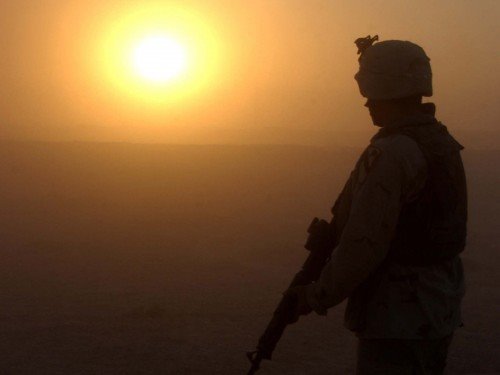Rape and Sexual Assault Allegations in the Military, Part 2 – The Surrender of Discretion
Nothing in this blog series should be misconstrued as suggesting that I believe all rape or sexual assault allegations in the military are false or that raising the issues I’m about to discuss disrespects women in any way (admittedly women are not the only alleged victims of rape and sexual assault, but they make up the vast majority). Neither interpretation could be farther from the truth. I have female friends and family members who proudly serve in the military and who agree with my views on this topic. I have also advised/represented women in the military who have alleged rape against other military members. Each case is different and the individuals involved in each case are different. It is important not to be quick to judge or vilify someone for raising legitimate concerns about how the military justice system handles these cases. I staunchly support our troops, regardless of gender or service branch.
This blog post also is not meant to suggest that no military commander, staff judge advocate, prosecutor or other member of the military justice system handles rape cases fairly and appropriately. That too would be an erroneous conclusion. Those cases, however, are beginning to fall into the “exception” category, rather than the “rule.” The issue for this post is that the military, generally, continues to struggle with how to handle rape and sexual assault cases.
As seen in the Duke Lacrosse rape case, these cases often involve so much emotion and personal investment by the accuser, the accused, the families and friends of either side, the investigators, the lawyers and the command that “justice” becomes a meaningless legal term rather than the goal or outcome of the criminal case. Winning can take precedence over fairness and objectivity. Avoiding bad press can replace discretion and seeking a just result.
In recent years, the highly publicized Air Force Academy “rape scandal” has had a dramatic impact on how rape cases are handled by all military branches. A couple years ago I wrote the following:
The Air Force Academy, like the rest of the Air Force, and military for that matter, are reactionary when it comes to bad press. As you may know, when a rape allegation is made in the military, it is investigated by the service branch’s criminal investigation agency (AFOSI, CID, NCIS, or CGIS). When that investigation is closed, the case is then forwarded to the legal office where JAGs evaluate the case and often conduct further investigation. Based on the evaluation and investigation by the legal office, the JAGs (Chief of Justice and/or Staff Judge Advocate) recommend to the accused’s commander how to dispose of the case and what charges are raised by the investigation.
If the commander decides to prefer general court-martial charges against the accused individual in a rape case, those charges must first be investigated in an Article 32 hearing where the presiding Investigating Officer makes recommendations about how the case should be disposed of. These recommendations are forwarded to the Convening Authority who can follow the recommendations or not, depending on his/her own discretion. At each step in the process, independent judgments are supposed to be made based on the ultimate interests of justice. There is a lot of discretion at each step, or, at least, there is supposed to be.
It used to be that questionable rape allegations could be stopped before a court-martial because someone in the military justice process, exercising their discretion, determined the allegation was not credible. The landscape changed dramatically after the Air Force Academy “rape scandal.” The Academy, the Air Force and, by implication, the military at large, received extremely bad press regarding how rape allegations were being handled. The press portrayed the Academy as anti-women and claimed that rape allegations were ignored and retaliation taken against women who raised such allegations.
Because of this bad press, the Academy, the Air Force, and the military at large have reacted with new initiatives to try to prevent these allegations and appear to be advocates for alleged rape victims who make these claims. For all intents and purposes, the discretion is now gone. If a woman alleges rape, no matter how much she, or the allegation, lacks credibility, that allegation will end up at trial. If someone in the process were to decide not to take the allegation to trial, the military’s fear is that the alleged victim would end up on news programs and/or the talk show circuit preaching against the uncaring, chauvinistic military. In addition, the military branches are conducting mandatory sexual assault awareness briefings in which the law is being misstated (more on this to follow). This only adds to the problem.
The reactionary change in how rape allegations are dealt with by the military has resulted in allegations which are very suspect going to trial and innocent young men facing the possibility of a rape conviction, jail time and a drastic change in the course of their lives.
The rape allegations at issue are alcohol-related acquaintance rape claims. Briefers at the mandatory sexual assault awareness briefings are telling audiences that intoxicated women are incapable of consenting to sex. The degree of intoxication seems irrelevant and some of the briefings/videos suggest that if a woman takes a drink of alcohol, she can no longer consent to sex. This is simply not true and it’s a dangerous misstatement of the law. Since the audiences at these briefings include those who might make claims of rape in the future, potential court members, convening authorities and legal staff, as well as the commanders and supervisors who make disciplinary decisions, these incorrect briefings affect the entire military justice system by affecting the players in that system. The law regarding lack of consent due to alcohol consumption is that an intoxicated person is only incapable of consenting if that person is so intoxicated that he/she is unconscious or is incapable of understanding the (sexual) act, its motive, and its possible consequences. (See DA PAM 27-9). Simply drinking alcohol or being in some state of intoxication does not amount to inability to consent.
Stated another way, an intoxicated woman can engage in consensual sex, so long as she is able to understand the act, its motive and its consequences. Lack of inhibition or judgment due to alcohol consumption does not equate to lack of ability to consent. A woman who would not have had sex with a particular man if she had been completely sober, and using her sober judgment, has not necessarily been raped if she has sex with that same man when intoxicated. “Morning after regrets” are not tantamount to rape. A woman who doesn’t remember consenting, or who has experienced alcohol-induced memory blackout of portions of a sexual encounter, has not necessarily been raped or assaulted by virtue of her alcohol-induced memory problems. Despite the politically correct messages perpetuated by the press and television talk shows, if a drunk young man and a drunk young woman have sex, the young woman is not automatically a victim and the young man a criminal. The only time that alcohol consumption equates to lack of consent is if the alleged victim is so drunk that he/she meets the definition above; which is an extreme state of intoxication rendering the person incompetent.
By briefing military members that intoxicated women cannot consent to sex, false information is purposely being spread. Since the audiences to these briefings include the players in the military justice system, even if some percentage of the audience members know the law is being misstated, they are receiving a message from the top that this is how such scenarios should be viewed and handled in the military justice system. Consequently, one interpretation of this scenario is that a purposeful effort is being made at the very top echelons of the military hierarchy to stack juries and unlawfully influence disciplinary decisions. It is unclear whether the motivation for this is misdirected good faith or an effort to appease the press and prevent any further bad press alleging the military doesn’t properly handle rape/sexual assault allegations. Regardless of the motivation, the effect remains the same – the fairness of the military justice system is being compromised.
I believe we are fast approaching the time when alcohol-related acquaintance rape allegations cannot fairly be heard in the military justice system, and every such court-martial should include motions to dismiss for court stacking and unlawful command influence. I also believe the numbers of alcohol-related acquaintance rape allegations in the military are heavily influenced by the fact that the military is sending the message to its women members that they bear no personal responsibility for their actions if drinking and that they have been raped or assaulted if they were intoxicated when they engaged in sexual activity. In other words, “the tail may be wagging the dog.”
False rape allegations do not necessarily mean the alleged victim is purposely lying. Guilt and shame are powerful motivators. If young women are being told they have been raped if they had sex when intoxicated and, at the same time, a young woman is suffering from shame and guilt over her sexual behavior when drunk, she may allow herself to believe she is a rape victim, when she is not.
The explanation above should not be interpreted as my belief that all or most rape allegations are false. That is not my intent. Just a few false rape allegations are far too many; they jeopardize innocent lives/futures and they offend true rape allegations and victims. I have attached a story by a young woman who made a false rape allegation. They do occur. I hope this helps.
That 2005 commentary was published on the website:
http://www.falserape.net/stevens_commentary.html
Based on the number and substance of military rape and sexual assault cases Frank Spinner (of counsel) and I (Richard Stevens) continue to be contacted about, the thoughts expressed in that commentary remain a valid concern in 2007.
In Part 1 of this blog series I asked whether the defendants in the Duke case would have fared as well under the Uniform Code of Military Justice (UCMJ) and would the military justice system have handled the Duke case better or worse than it was handled in the civilian world? Based on what I have seen in representing members of all service branches, unless the alleged victim recanted, it is unlikely that the charges would have been dropped in the military. That's because of the fear that the woman would end up on the talk show circuit bad mouthing the military and causing public scandal. In the military, even if a woman (herself serving in the military) does not want to go forward with her allegations, if she has already discussed them with a third party she can be compelled to testify against the accused. The actions taken by Attorney General Roy Cooper in North Carolina were an exercise of discretion - something that has been largely surrendered in handling these cases in the military. Again, this is a "broad brush" treatment that may not apply to all military cases, but it applies in a disturbingly high number of them.
More to come…
By: Attorney Richard V. Stevens
Civilian criminal defense lawyer and military defense lawyer
Military Defense Law Offices of Richard V. Stevens, PC
http://www.militaryadvocate.com
Blog postscript: Attorney Frank Spinner and I (attorney Richard Stevens) are former active duty military lawyers (JAG). Our perspectives and advice, therefore, are based upon our experience as military defense lawyers and as civilian criminal defense lawyers practicing exclusively in the area of military law. This blog addresses issues in military law, military justice, military discipline, military defense, court-martial practice, the Uniform Code of Military Justice (UCMJ) and other military and/or legal topics. Nothing posted in this blog should be substituted for legal advice in any particular case. If you seek legal advice for a particular case, please contact The Law Offices of Richard V. Stevens & The Law Office of Frank J. Spinner for a free consultation.
Friday, April 13, 2007
Subscribe to:
Post Comments (Atom)

























1 comment:
http://pcrevolt.blogspot.com/2007/04/duke-on-severn-kenny-ray-lamar-owens.html
Post a Comment